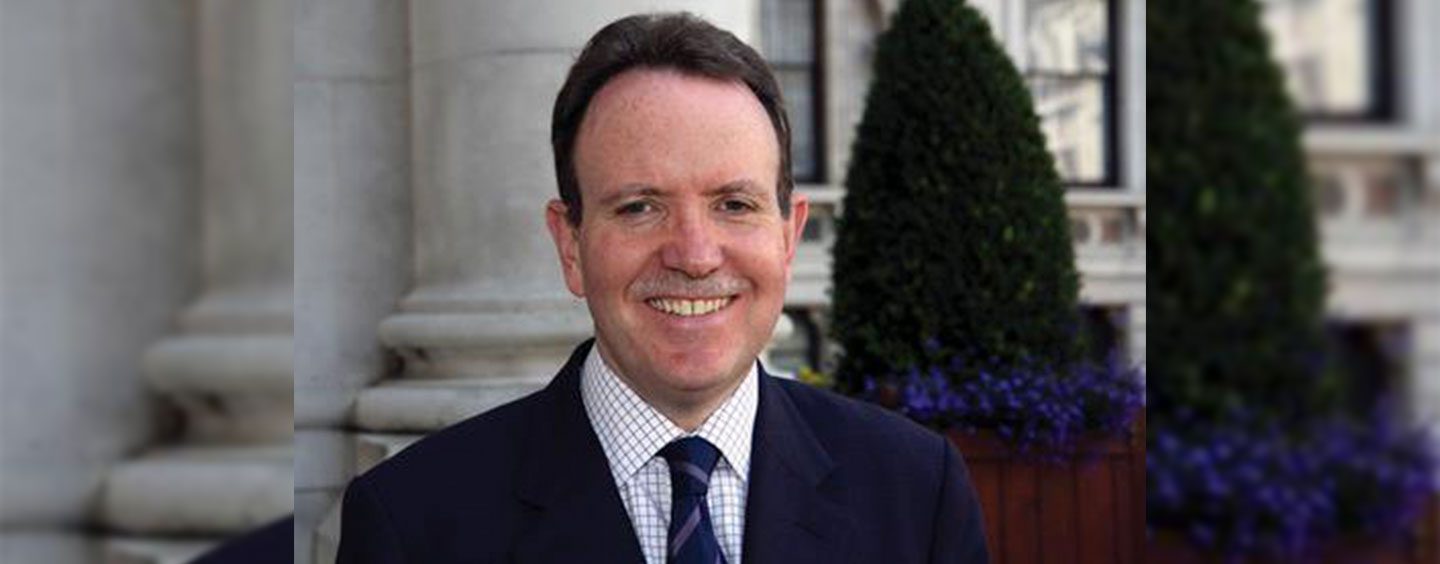
Azerbaijan is Indeed the Largest and Most Prosperous State in the South Caucasus.
An Interview with Mr. Peter Bateman, Ambassador of the United Kingdom to Azerbaijan.
AT: Mr. Bateman, diplomatic relations between the United Kingdom and the Azerbaijan Republic have historical roots. These relations began at the time of the Azerbaijan Democratic Republic (1918). Could you please tell our readers something about this?
I have to admit that I am not a historian and know little about the details of the Azerbaijan Democratic Republic. So I would not want to speculate to your readers on a subject about which I know little. Having said that, it is clear that the Azerbaijan Democratic Republic was a shining example of a liberal secular Muslim state, more advanced socially in many ways than more ancient countries such as the UK or the US (for example in terms of votes for women). Sadly that beacon of emancipation was snuffed out by the Soviet Union, happily to re-emerge 70 years later as a country with which the UK has the closest of relations.
AT: This year marks the 20th anniversary of diplomatic relations between the United Kingdom and Azerbaijan. Are you pleased with the current state of bilateral relations between our countries?
That is indeed true, and I was pleased to be able to pay tribute to those 20 years of relations during the recent party we held to celebrate the 60th anniversary of the Reign of Her Majesty the Queen.
In principle, I am satisfied with relations as they stand, although no Ambassador can ever be entirely happy with the state of bilateral relations with his host country. Almost by the definition of our job, we always want to make things even better. At the present moment, the United Kingdom has warm and close bilateral relations with Azerbaijan across a broad spectrum of areas. These include political relations, economic and commercial relations, cultural relations; defence and, of course, people to people links. For example, we now cooperate closely and successfully on the United Nations Security Council. But we can always do better, and it is the job of this Embassy, and its counterpart in London, to do whatever we can to improve relations even further.
In addition, of course, thanks to our membership of multinational organizations such as the European Union and NATO, our links, and our efforts to improve them, extend far beyond the bilateral and we work hard with our many international partners to improve our multilateral relationship with Azerbaijan as well.
AT: Many energy companies of the world invested in our country after Britain’s BP demonstrated its interest in Azerbaijan’s oil and gas deposits after Azerbaijan regained its independence in 1991. It is precisely Western countries’ activity and investment in Azerbaijan that brought stability to our country. This is an undeniable fact. We would like you to give our readers some information about this.
I think the main reason for Azerbaijan’s stability since the dark days following the collapse of the Soviet Union lies first and foremost with the Government and people of Azerbaijan and their wish for a better and more secure future for all. Having said that, we also like to think that investment by companies from the West has played an important role in helping bring about such stability. There is no doubt that foreign direct investment, especially from the UK but also from many other countries, has been a key factor in producing the wealth and prosperity that have helped Azerbaijan overcome the many problems of the post Soviet period. For example, reducing the poverty rate from over 50% to under 10%. There have been many such remarkable achievements in the last 20 years, and we are proud that the UK and British companies have been able to play their role. But we should never underestimate the contribution made by millions of Azerbaijanis, both inside and outside government, to that same vital goal.
But foreign direct investment is a two way street. Now that Azerbaijan is achieving such notable strides in its economic development and wealth, we are also keen to encourage Azerbaijani investment in the UK. We therefore hope that the Sovereign Wealth Fund of Azerbaijan, Sofaz, will choose to invest some of its funds in the United Kingdom. We are confident that we can help it achieve its mandate of securing safe and long-term sources of further wealth for Azerbaijan and its citizens.
AT: Today the Azerbaijani state is using oil revenues to develop the non-oil sector and establish new infrastructure. Many Western companies are actively involved in these projects. Are there British companies interested in coming to Azerbaijan and participating in these projects?
Yes indeed. We very much support the objectives of the Azerbaijani Government to diversify the economy away from an over-reliance on one or two sectors (most notably energy and agriculture). We are keen to encourage British companies to play their role in this process via investment and technology transfer. As it happens, there are already a number of UK firms already active and successful in sectors such as construction and retail.
But there is so much more we could be doing in a variety of key sectors such as IT; financial services; logistics; tourism; utilities and education, to name but a few. These things take time of course and should be seen as medium term objectives. But one of my activities in the UK is to talk to business groupings to brief them on the situation in Azerbaijan and to encourage them to take a closer look at the opportunities here.
AT: In the recent period, many young Azerbaijanis enter British institutions of education. Even SOCAR’s newly-founded Higher Oil School has decided to issue joint diplomas together with a British oil university. Are there any new intergovernmental projects in the field of education?
The United Kingdom is proud of its university sector and its reputation as one of the best (if not the best) place for international students to study. We are therefore delighted that so many talented young Azerbaijanis have chosen our country to do so. We are also pleased that universities such as Heriot-Watt have been developing bilateral links with organizations such as SOCAR. We are sure they have much to contribute to specialist higher education here.
We know there are a number of other such projects in planning. But British universities are independent bodies, free to choose their own international objectives and bilateral university links are not generally the result of intergovernmental projects. Having said that, the British Embassy and the British Council will always be happy to provide any support they can as required.
AT: Is there any tendency towards development in other spheres – culture, arts and sports – in bilateral relations between the United Kingdom and Azerbaijan?
I think there has been considerable activity across all these sectors, and many more, recently. For example, there have been a number of exhibitions of Azerbaijani art and culture in London in the recent past. These have been able to bring both ancient and modern Azerbaijani artistic achievements to the attention of many British people hitherto unaware of the riches of your civilization. As far as sport is concerned, London has just been the centre of the biggest celebration of Olympic and Paralympic sport in the history of the world. We are delighted that so many Azerbaijani athletes were able to participate in both and furthermore enjoy such success. Sadly, no British team qualified for the recent FIFA Women’s Under 17 World Cup, but we look forward very much to the two planned qualifying matches between Azerbaijan and Northern Ireland for the 2014 World Cup.
AT: Azerbaijan is regarded as a leading state from an economic point of view among Caucasus republics. What Caucasus republic do you prefer in terms of the development of democratic institutions and human rights?
Azerbaijan is indeed the largest and most prosperous state in the South Caucasus. It is also emerging as a player of increasing international significance with, for example, its non-permanent membership of the Security Council. It has been a pleasure to work with you so closely in that forum.
But there is no sense in which the United Kingdom has particular favourites in this context either in the South Caucasus or more widely. We recognize the difficulties that many young countries have in adapting quickly to modern standards of democracy and human rights which have take hundreds of years to achieve in the West, (and which are still far from perfect). We recognize also that former republics of the Soviet Union have particular disadvantages to overcome in this context, given the blanket 70-year obliteration of these rights under that regime. We therefore welcome the commitments given by the Azerbaijani government in their public statements and in their membership of international organizations such as the OSCE and the Council of Europe to achieve these goals and stand ready to help both as the UK and as a member of the EU in any way we can.





